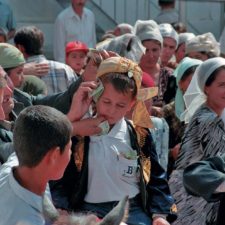One of the widespread traditional ceremonies among the nations of the East is the ceremony called “khatna” – ceremony of dedication to a man. Although khatna was under a strict ban for decades, every child in a muslim family was circumcised. In those times khatna was usually held secretly. However, only did the name change, while it was anyway celebrated permanently.
This tradition had existed before the foundation of Islam, in times of zoroastrizm – the religion of Akhura Mazda-Avesto in Iran and Turan. It is also conducted in other religions like Judaism. Ancient Jews conducted circumcision certainly in a twelve day period after the birth of a boy.
Even though this tradition had been practiced in Central Asia long since, it was legalized only after the introduction of Islam. Every man should pass this ceremony, which is obligatory for Muslims.
Tuy People call this ceremony “sonnat toy”, which means the celebration of circumcision. Not long ago when it was prohibited some of the family arrangements like birthday, entrance to a school were used as masked names of khatna tradition.
Circumcision is carried out by a special physician master who grips the tip of the genital organ with two cane forceps and flicks off the skin at the top of a penis. After this procedure a light fabric is laid above a velvet blanket on which a boy lies. Doppi (embroidered skull-cap), that protects from contact with a blanket or other material, is put on the penis.
Afterwards the relatives of the boy come to congratulate him. They give presents and money. The boy usually recovers and gets on his feet in a week. By this time a cotton shirt and wide white trousers will be sewn for him.
There are three duties of each father in Islam:
First, to conduct circumcision of his son. Second, to give him a good education, to teach him a profession and to introduce to the world. Third, to marry him, to assist him to build a house and to start an independent life.


